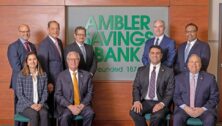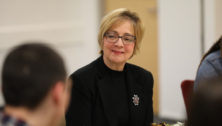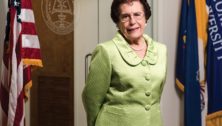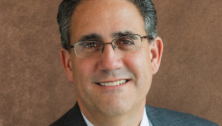Delaware County Leadership: Col. Nick Nichols, President, Folds of Honor
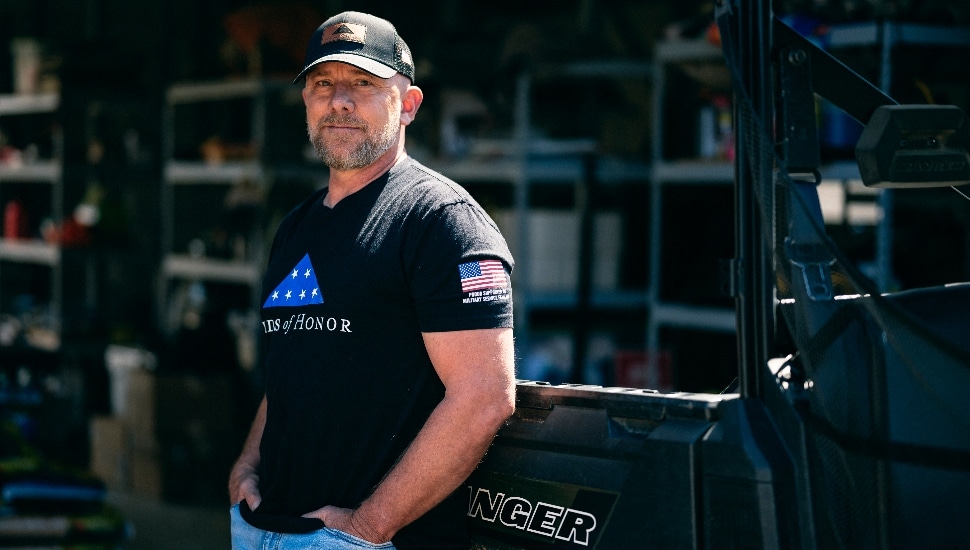
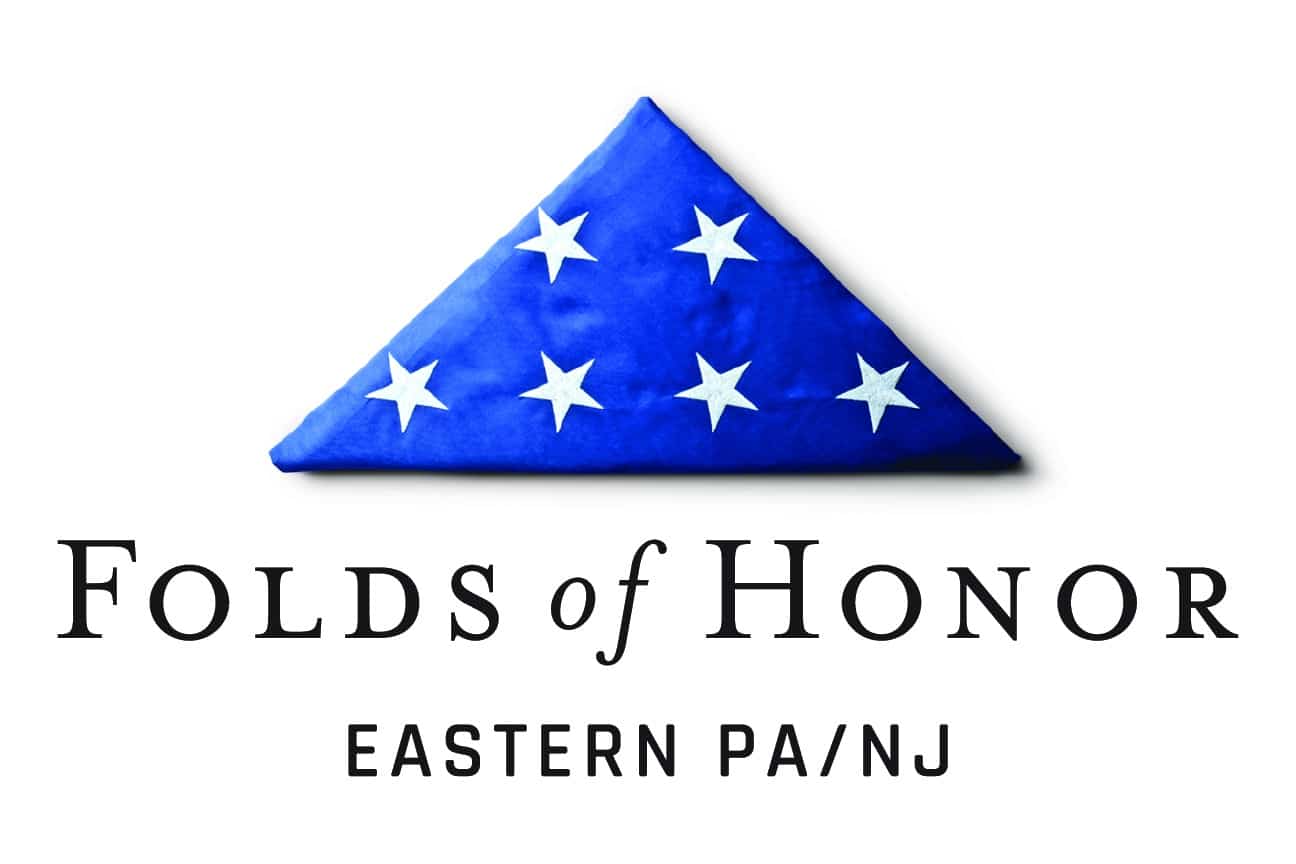
Col. Nick Nichols, President at Folds of Honor, grew up living all over the U.S. and the world as the son of an Air Force fighter pilot. He learned to make friends quickly through sports, particularly wrestling, which he credits with teaching him discipline.
Nichols followed in his father’s footsteps and served in the Air Force for almost 30 years before retiring in 2018 and joining Folds of Honor, a nonprofit that gives academic scholarships to the children and spouses of fallen or disabled military service members and first responders. Nichols discussed his priorities for Folds of Honor and shared his thoughts on leadership and faith.
Where were you born and where did you grow up, Col. Nick?
I was born the oldest of three children at Moody Air Force Base in Valdosta, Georgia. My dad, who was an Air Force fighter pilot, was in pilot training during that time. I didn’t grow up there – I lived all over the place – but I ended up back there to go to college.
What memories stay with you from growing up in all those different places?
We got to live overseas – that was neat. It was always tough moving every three years – having to make friends, having to leave, going to a different school. But I think it makes you resilient, being able to go into new situations and adapt quickly.
How did you adapt when moving from place to place?
If I wanted to have friends, I had to put myself out there and make it happen. Sports was typically my way to do that. I played football and soccer growing up.
And your dad was in the Air Force?
Correct. He was a fighter pilot in the Air Force. He flew F-100s and F-4s in Vietnam. He was, unfortunately, killed in an auto accident when I was 15.
I’m sorry for your loss Col. Nick. What did your mom do to make ends meet?
Prior to my dad’s death, my mom had the most noble career, which was being a stay-at-home mom. After he died, my mom went back to school and became a mental health counselor.
You said you played sports – what was your favorite sport?
My favorite sport – not because I enjoyed it the most, but because it instilled the most discipline in me – was wrestling. I’ve always liked doing difficult things. When you’re on a wrestling team, when you’re on the mat, you’re the only person there. You can’t count on a teammate to jump in and help you out. It made me tough and resilient. I recognized that stepping into scary situations, I could handle it.
Was there a match that stands out in your mind all these years later?
To be honest, it was the practices I remember most. I was an okay wrestler, but I wasn’t going to win state championships. But I loved the camaraderie of the team – it was like shared misery, and that formed good friendships.
Where do you think that love of doing tough things comes from?
Definitely from my dad. Like I said, he was an Air Force Academy grad and did two tours in Vietnam, so he had been through and done a lot of stuff. Amazing human being. He instilled a lot of that discipline in me.
When you lose your dad at 15 years old, you have two choices. You can embrace the fact that life has changed and be resilient and move on and work hard and not use that as an excuse for the rest of your life, or you can cave into it. I chose the former.
What about jobs? Were you working as a teenager?
I had the most eclectic career of odd jobs growing up! As a kid, I remember delivering the Washington Post when we were living in Washington D.C. When we were in south Georgia, I cropped tobacco during the summer. If you ever want to give a kid the appreciation of a dollar earned, get them out in the tobacco fields. They will quickly figure out that this is not what they want to do for the rest of their life.
Like I said, I lost my dad at 15, so I was on my own for college. I ended up working for Roadway Express on the loading docks pretty much every night for four years during college to keep myself afloat and pay my tuition.
What lessons did you learn from all those jobs that influenced how you live today?
The biggest lesson I learned came around my freshman year of college. It was really two things. Number one, nobody’s coming to rescue you. You’re it.
And number two was, to control the controllables. For me, that was realizing I am who I am, and how God made me. I’m not going to be the smartest or the most talented. But the one thing I could control was not letting anybody outwork me.
What kind of music were you listening to in high school and college?
That was in the ‘80s for me, so I was in to ‘80s country, like Alabama.
Did your tastes in music change over time?
A little bit. But when I get up early every morning and work out, I put on the same country radio station. I would not consider myself somebody who’s big into music. My wife certainly is, and all three of my kids are.
You were a good student, and a hard worker – you could have gone anywhere for college. Why did you go back to Valdosta?
After my dad died, that’s where my family ended up. I felt compelled to stay in that area because of my brother and sister and mom.
Did you look anywhere else?
I toyed with going to the Air Force Academy, but I got the ball rolling way too late. You’ve got to start as a sophomore or a junior in high school, and I was a senior. I knew I wanted to go into the Air Force and be a fighter pilot, and Valdosta State had an Air Force ROTC program. It was a win-win for me, a great fit.
So, looking back, was Valdosta State a good choice for you?
It was the best choice. I had a wonderful time there. The instructors and leadership in the ROTC detachment were amazing.
Who were the people who saw promise in you, in high school and college and across your career, that opened up doors and made your accomplishments possible?
A couple of names come to mind. Early on, when I was in Air Force ROTC, my instructor, Captain Pye, took an interest in investing in me. I think he thought I was a unique animal because he said, “Nobody ever says when they come in here that they’re going to be an F-16 fighter pilot.” I wasn’t there just to join the Air Force – if another service had the F-16, that’s where I would be going. I think he admired that. He was awesome – he helped me out all through my college career, and was there when I was commissioned. He was just an amazing human being.
The second person, early in my career, who I remember was my flight commander at my first operational duty station as an F-16 pilot at Misawa Air Base, Japan. I was a young lieutenant and I was fired up and wanted to be the guy. I was competing to get into this upgrade for the F-16, and another guy got it. I was not having it. I felt like I was better than that guy. My flight commander pulled me aside and he said, “I’m going to help you out. You know what the Air Force owes you?” I go, “No, what?” He goes, “Nothing. There are going to be times you work hard, you may be deserving, and you’re not going to get it. And you need to be okay with that.” It reset my attitude in that, you know what, this isn’t all about me, this is a team.
Anybody else that comes to mind who saw something special in you?
Yeah, of course, the memories of my dad.
What did your dad see in you early on, Nick?
That’s a great question. I don’t know, but I know he was willing to invest time in me. Whether it’s a minute or 30 minutes or whatever it might be, time is the greatest commodity, and I always remember him being there.
And he wasn’t always there there – he was on missions, he was away, he was a busy man. But you remember him for being there and being present in your life?
Yeah, but he could be. As a military kid, your dad or mom might be gone, but it’s the importance of being present when you are home. That’s especially important in modern society with the distractions that we’re all guilty of and being intentional about making that time.
So, what brought you to Folds of Honor?
I met Dan Rooney, our CEO and founder, probably 20 years ago, flying F-16s. He was a young guy in the squadron and that’s how we connected. At some point, he left the unit so he could continue to grow the Folds of Honor mission. I stayed in the military. We stayed in contact for several years, and I was looking at retiring, which I did in 2018. He and I had been talking, and it worked out.
It’s been a great place for me to land. I didn’t want to be an airline pilot, didn’t want to go into industry like a lot of guys did. This felt good. Our mission is to send kids like me, 15-year-old me, to school, so it seemed like a great fit and a place I could continue to serve. I was in for 30 years, and hanging up the uniform after that amount of time is hard.
Share a quick elevator pitch of what Folds of Honor does.
Folds of Honor is a nonprofit that provides educational scholarships to the spouses and kids of military service members and first responders who have either been killed or disabled. We’ve put about $265 million into about 50,000 scholarships. This next class is about 9,000 students and $32 million out the door. And we’re doing that at 91 cents on the dollar. We like to use a fighter pilot term – high speed, low drag.
I was astounded by that. The other thing that impressed me is how diverse your class is. It’s not just men – it’s across the spectrum of America.
That’s the neat thing about the military. It is the ultimate American melting pot, which I think says something cool about the country.
Everybody gets into the military for different reasons. I’ll be the first to say that it wasn’t all “mom, apple pie and red, white and blue.” I wanted to be a fighter pilot. But once you get in there and recognize the camaraderie and brotherhood, it grows on you. It becomes a part of you, and it shapes us into this melting pot of a brotherhood and sisterhood that can’t be duplicated anywhere else.
You’re halfway through 2023 – what are you focused on? What’s your highest priority?
The highest priority right now, especially this time of year, is fundraising. As a nonprofit, 65% of our funding comes in the first quarter. So now is the time to dig in and continue working with corporate partners and hosting all of the events we have going on for the rest of the year.
Any new initiatives to drive revenue that you’re excited about?
There are lots of areas that the team is working on. I’m focused on the outdoor space. We have a lot of big outdoor partners like Yeti, Sitka, and Winchester. Plus, we’ve partnered with the Outdoor Sportsman Group, which owns a lot of outdoor media like the Outdoor Channel and the Sportsman Channel. All of these companies have come in as wonderful partners, and we’re reaching a demographic we haven’t reached in the past.
We’ve been highly successful and continue to grow our influence in golf, which is amazing. Our CEO and founder is a PGA golf professional, so that’s where a lot of his passion lies, and appropriately so because there’s a lot of money there. My passion lies in the outdoor space. Taking Folds of Honor to the masses in the outdoor space is my huge initiative.
I have three final questions for you Col Nick. What keeps you hopeful and optimistic? It’s a crazy world out there – you’ve seen the best and the worst of human beings in your life.
What keeps me hopeful and optimistic is that every day is a new day. I get up early, before sunrise, to feed the dogs and have my coffee, and then I work out. What keeps me hopeful and optimistic that I reflect on in the morning is, one, my relationship with God. That’s unwavering.
And, two, what I experience in reality is different than what I’m hearing on the news. We don’t hate each other as much as they say we do. There’s so much common ground, which is why I love Folds of Honor, because I think we have the greatest unity message on the planet. We represent the people who secure our freedom and secure our safety. If you can’t get behind taking care of those families, then you probably don’t care about a whole lot.
There’s an optimistic approach to that, and meeting each day, when the sunrise comes up, as a new day. It’s a new beginning. Yesterday was yesterday. Today is today. Let’s look forward and make a new day happen and seize the moment.
What’s something big that you’ve changed your mind about over the last five or 10 years?
Personally, when you look at the purest form of being with God, that is actually, for me, not found within the walls of a church. It’s in those times when you’re watching the sun rise or seeing what God created – something natural and real – because all those things come from him. My connectivity with God, I’ve realized, isn’t through an institution. I’m not by any stretch of the imagination being dismissive of those institutions, because there’s a lot of good there, but for me personally, it was the best route because it takes away all the white noise.
Finally, Col. Nick, what’s the best advice you’ve ever received?
One of the things I learned early on about leadership is, don’t make decisions based on fear. A lot of people are leading to not get in trouble. You can’t do that. You have to do the right thing, always – even if the leadership above you is going against the grain of what you’re doing. At the end of the day, you’re the one who’s got to look yourself in the mirror and live with yourself.
If you make decisions based on fear, the next thing that goes is integrity, and it’s a slippery slope from there. Where are your boundaries? It takes courage to be a leader, it takes hard work and a lot of people are not going to like you. That needs to be okay with you. It’ll make you an effective leader.
Join Our Community
Never miss a Delaware County story!
"*" indicates required fields













![95000-1023_ACJ_BannerAd[1]](https://delco.today/wp-content/uploads/sites/3/2023/03/95000-1023_ACJ_BannerAd1.jpg)















